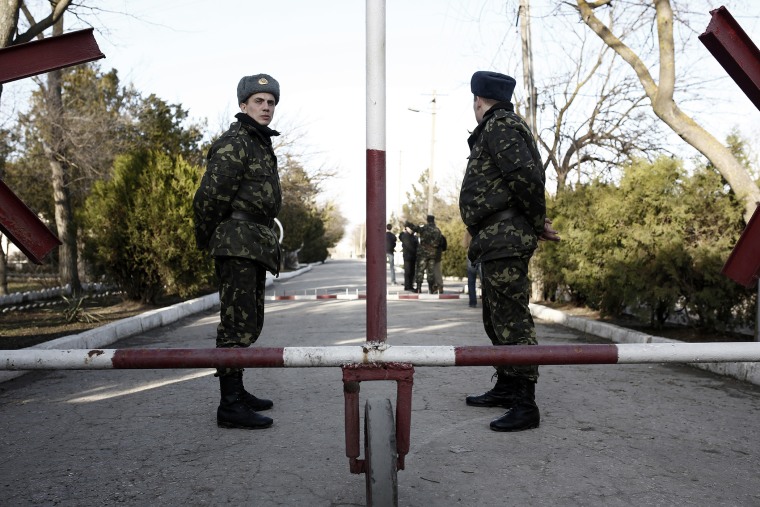Russian officials voiced support for Crimea’s vote for secession on Friday, the New York Times reported, with the heads of Russia’s Parliament announcing that the Ukrainian peninsula would be welcomed back into the Russian Federation.
The announcement came hours after President Barack Obama condemned the vote as unlawful and spoke by phone with Russian President Vladimir Putin to emphasize the sovereignty of Ukraine.
“The proposed referendum would violate the Ukraine’s constitution and international law,” Obama said in a brief statement Thursday at the White House. “In 2014, we are well beyond the days when borders can be redrawn over the heads of democratic leaders.”
On Thursday, Crimea’s Parliament voted unanimously—with eight abstentions—to ask Russia if it was open to absorbing the predominantly ethnic-Russian peninsula of Ukraine. If so, Crimea promised to pose a ballot referendum on March 16 to allow the people to ratify their vote. Some have questioned whether a region that has been occupied by an estimated 16,000 Russian troops is capable of holding a fair and free referendum on the matter.
Putin has maintained that Russia has no intention of annexing Crimea, but on Tuesday, he said during a press conference that the region should be able to decide its own fate. Putin also denied that there were Russian forces in the region.
“I do not see an annexation of Crimea as an opportunity,” he said. ”I emphasize that only the citizens of a particular territory have a right to decide for themselves.”
It’s a peculiar narrative for Russia, which has denied longstanding and similar requests from regions like Dagestan and Chechnya.
Crimea, like Russia, denies the legitimacy of the Ukranian Parliament after the ouster of President Viktor Yanukovych.
“This is our response to the disorder and lawlessness in Kiev,” said Sergei Shuvainikov, a member of the local Crimean legislature, on Thursday. “We will decide our future ourselves.”
Sergi Naryshkin, the speaker of Russia’s State Duma, the lower house of the Parliament, announced thestate’s strong support for the move on Friday.
“We’ll support free and democratic choice of the Crimean population,” he said, according to the news agency Interfax.
The speaker of the upper house of Russia’s Parliament also announced support and affirmed the country’sbelief in the vote’s legitimacy.
“If the people of Crimea demonstrate their will and will make such a decision – about becoming a part ofRussia’s territory – we as the upper chamber of parliament will support their decision,” Speaker ValentinaMatvienko told a delegation of Crimean leaders, according to the Russian news agency ITAR-TASS.
“Without a doubt, the Crimean parliament, as a legitimate authority, has that right … The sovereign right of the people to determine their future,” she added.
Both Moscow and Washington released contrasting statements on the latest call between Obama and Putin.
“Vladimir Putin noted that the current Ukrainian government, which came to power as the result of an unconstitutional coup and was not supported by a nationwide mandate, is imposing entirely illegitimate decisions onto Crimea and the eastern and southeastern regions of Ukraine. Russia cannot ignore calls for help on this matter and is responding accordingly, in full compliance with international law,” the Kremlin’s statement read in part.
The American statement reiterated the well-repeated steps for de-escalation and focused on the United States’ position that the invasion was unlawful.
“President Obama emphasized that Russia’s actions are in violation of Ukraine’s sovereignty and territorial integrity, which has led us to take several steps in response,” the White House said in a readout of the call.
Secretary of State John Kerry continued talks with his Russian counterpart, Foreign Minister Sergey Lavrov, Friday aboard his plane en route back to Washington from Jordan. While the State Department has not yet issued a readout of the call, Russia’s Foreign Ministry reported that Lavrov told Kerry that any sanctions imposed by the U.S. and the European Union would “boomerang” to negatively affect the West. Coupled with visa restrictions by the State Department, Obama announced sanctions targeting “those who are most directly involved in destabilizing Ukraine,” including the military invasion of Crimea. Press Secretary Jay Carney did not elaborate on whether that would include Putin during a press briefing Thursday. European leaders did not impose sanctions during a meeting in Brussels Thursday, but vowed to keep the possibility open “in the absence” of corrective action by the Russians.
Lavrov “warned against hasty and reckless steps capable of causing harm to Russian-American relations, particularly ... sanctions, which would inevitably hit the United States like a boomerang", the Foreign Ministry said, according to The Voice of Russia.
Secretary of Defense Chuck Hagel discussed humanitarian aid and disaster relief with his new Ukrainian counterpart Friday morning, according to Pentagon Press Secretary Kirby, who noted that the two did not discuss relief efforts that would involve U.S. personnel on the ground in Ukraine.
Obama also spoke to Japanese Prime Minister Shinzo Abe late Thursday.
“The two leaders agreed that Russia’s actions are a threat to international peace and security and emphasized the importance of preserving Ukraine’s sovereignty and territorial integrity,” a White House statement said. “They committed to work with other G-7 partners to insist that Russia abide by its obligations and commitments to Ukraine’s sovereignty.”
